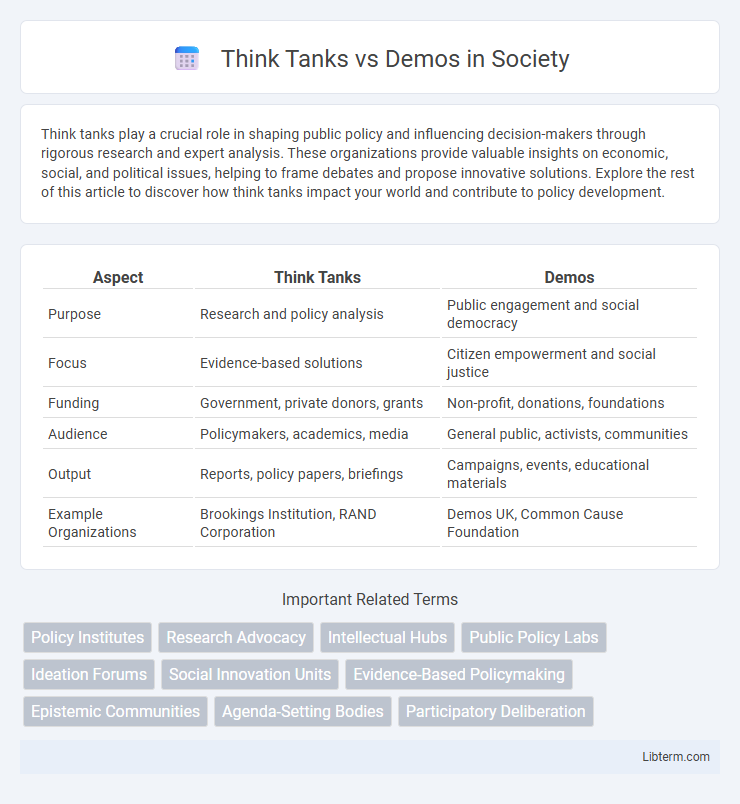Think tanks play a crucial role in shaping public policy and influencing decision-makers through rigorous research and expert analysis. These organizations provide valuable insights on economic, social, and political issues, helping to frame debates and propose innovative solutions. Explore the rest of this article to discover how think tanks impact your world and contribute to policy development.
Table of Comparison
| Aspect | Think Tanks | Demos |
|---|---|---|
| Purpose | Research and policy analysis | Public engagement and social democracy |
| Focus | Evidence-based solutions | Citizen empowerment and social justice |
| Funding | Government, private donors, grants | Non-profit, donations, foundations |
| Audience | Policymakers, academics, media | General public, activists, communities |
| Output | Reports, policy papers, briefings | Campaigns, events, educational materials |
| Example Organizations | Brookings Institution, RAND Corporation | Demos UK, Common Cause Foundation |
Understanding Think Tanks: Definition and Purpose
Think tanks are research organizations dedicated to analyzing public policy issues and providing evidence-based recommendations to influence decision-making. Unlike Demos, which often emphasizes progressive advocacy, think tanks prioritize rigorous data analysis and expert insights to shape policy debates. Their purpose centers on generating innovative solutions and informing legislators, stakeholders, and the public through comprehensive reports and strategic communication.
What Are Demos? Origins and Focus
Demos is a public policy organization founded in 2000 that aims to promote inclusive democracy and economic fairness through research and advocacy. Originating in the United States, it focuses on addressing income inequality, voting rights, and corporate influence in politics. Demos distinguishes itself by combining data-driven analysis with grassroots activism to influence policy reforms.
Key Differences Between Think Tanks and Demos
Think tanks primarily focus on producing rigorous research, policy analysis, and expert-driven reports aimed at influencing government decisions, whereas demos emphasize public engagement, grassroots activism, and citizen participation in policymaking. Think tanks often operate with specialized experts and extensive data modeling, while demos prioritize inclusive dialogue and diverse community voices to shape policies. The fundamental difference lies in think tanks' top-down expertise approach versus demos' bottom-up democratic involvement strategy.
Organizational Structures: Think Tanks vs Demos
Think tanks typically have hierarchical organizational structures with specialized research departments, enabling focused expertise and long-term policy development. Demos, as a progressive public policy organization, employs a more collaborative and interdisciplinary structure that emphasizes community engagement and rapid response to social issues. These structural differences shape how each entity generates influence and implements policy strategies.
Methods of Research and Policy Influence
Think tanks primarily employ rigorous quantitative analysis, expert interviews, and comprehensive literature reviews to generate evidence-based policy recommendations, leveraging long-term research projects to influence policymakers and public debate. Demos utilizes participatory research methods such as citizen panels, focus groups, and storytelling to integrate diverse public perspectives into policymaking, aiming to foster democratic engagement and social innovation. Both organizations prioritize detailed policy reports and strategic communication to shape legislative agendas, yet think tanks emphasize technical expertise while Demos centers on inclusive dialogue and grassroots involvement.
Funding Sources and Transparency
Think tanks typically receive funding from a mix of private donors, foundations, corporations, and government grants, often disclosing their sources to varying degrees depending on their policies and legal requirements. Demos, as a progressive think tank, emphasizes transparency by publicly listing major donors and funding sources on their website, promoting accountability and trust. This commitment to openness contrasts with some think tanks that operate with less financial disclosure, affecting perceptions of bias and influence in policy research.
Impact on Public Policy and Society
Think tanks and demos play distinct roles in shaping public policy and society; think tanks primarily influence policy through rigorous research, expert analysis, and strategic recommendations that guide decision-makers. Demos engage the public directly by facilitating dialogue, fostering democratic participation, and amplifying citizens' voices to ensure policies reflect community needs. The impact of think tanks often manifests in expert-driven policy formulation, while demos contribute to legitimacy and social inclusion in governance.
Think Tanks vs Demos: Case Studies
Think tanks provide in-depth policy research and expert analysis, while demos emphasize public engagement and community-driven solutions. Case studies highlight the London-based think tank Institute for Public Policy Research, known for rigorous data-driven reports, contrasted with Demos, which prioritizes participatory democracy and innovative methodologies for social change. Both organizations influence policy, but their approaches differ in balancing empirical research with grassroots involvement.
Criticisms and Controversies
Think Tanks often face criticisms for potential biases linked to their funding sources, raising concerns about the impartiality of their research and policy recommendations. Demos, while focusing on social justice and inequality, has been subject to controversies regarding the transparency of their funding and the political alignment of their advocacy. Both organizations encounter debates about their influence on public policy, with critics questioning the extent to which they represent diverse viewpoints versus advancing specific ideological agendas.
The Future of Policy Advocacy: Collaboration or Competition?
Think tanks and Demos represent two powerful forces in shaping policy advocacy, each employing distinct strategies to influence public debate and legislative outcomes. Think tanks often leverage rigorous research and expert analysis to inform policymakers, while Demos emphasizes grassroots mobilization and public engagement to drive systemic change. The future of policy advocacy will likely hinge on whether these entities choose collaboration, blending evidence-based research with civic activism, or maintain competition that highlights their differing approaches to effecting social and political reforms.
Think Tanks Infographic

 libterm.com
libterm.com